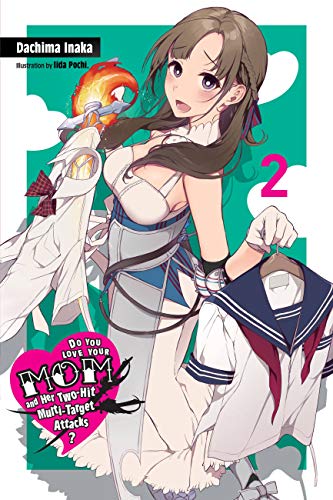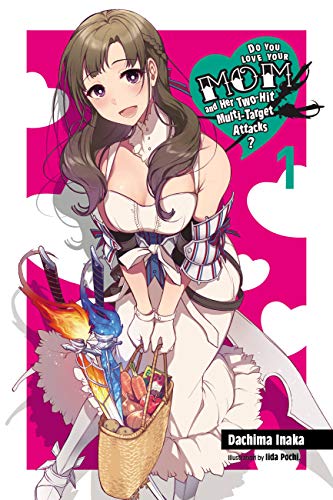By Dachima Inaka and Iida Pochi. Released in Japan as “Tsujo Kogeki ga Zentai Kogeki de Ni-kai Kogeki no Okasan wa Suki desu ka?” by Fujimi Shobo. Released in North America digitally by Yen On. Translated by Andrew Cunningham.
Here we are with the second volume of everyone’s favorite parody. Last time, I was very pleased with the over the top humor and the fact that, desp[ite “lol incest subtext” being the premise, the book did not lean overheavily on any actual incest subtext. That’s still the case with the second book, which is not QUITE as funny but still has lots of amusing moments. Now that it’s an ongoing series, the author has to figure out how much it can rely on “this is a parody” and how much it actually has to take its plot seriously. Sometimes it doesn’t succeed – there’s a couple of stock fanservice moments in the middle of the book that are meant to be funny but made me cringe. Fortunately it fares better with its ongoing plot, which is comparing and contrasting Mamako to other moms in this game and realizing that she is, in fact, pretty awesome.
As the cover might have warned you, this second volume gets Mamako into a sailor suit school uniform. Our heroes find their next quest involves taking a week of school at a stock high school with NPC Teacher guy and a class so generic that their faces are literally ASCII art. Technically it’s kids-only. In reality, Mamako is there as an “observer”, and of course can’t resist taking up the spotlight and embarrassing her son. Also there is a pretty newcomer, Medhi, and her own mother (who is named “Medhimama” throughout the book, but I’m assuming that’s shorthand, as opposed to Mamako’s blatant actual name). Medhi is saddled with a classic “Education Mama” to the nth degree, who insists she be number one in everything. And while Medhi seems to be taking this with grace and patience, in reality she’s a seething cauldron of resentment waiting to go off.
Let’s get this out of the way immediately: the middle of the book has Mamako briefly molested by a tentacle monster, though it doesn’t get very far. There’s also a scene where Mamako has to apologize to customers for something (school festival booth), and her bouncing breasts are leered at quite a bit. These two tropes are not particularly part of what Mom Isekai is parodying, and so I am less inclined to give them a pass. They’re bad. Also, and possibly running the risk of taking this series too seriously, the relationship between Medhi and her mother is pretty abusive and toxic, a fact explicitly spelled out. As a result, I was a bit annoyed that Medhimama was possessed by some sort of illegal “dark item” (it came up last time as well, if I recall) that made her much worse. This makes it sound like the abuse was not her fault, which isn’t what the author wanted to say, I suspect. On the brighter side, the relationship between Mamako and her son is much better in this volume. He’s a good kid, and she’s a good, if overly affectionate, mom.
I still enjoyed this volume in general, even with my carps above. Those who like wacky parodies will still enjoy it, those looking for hot hot mom-son love will probably be frustrated. And it definitely needed more of Mrs. Shiraaase, who appeared far less this time around.



